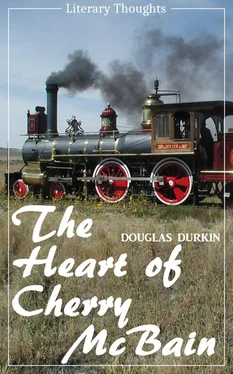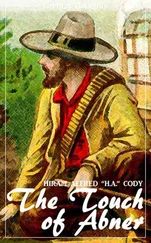The Heart of Cherry McBain
by Douglas Durkin
Literary Thoughts Edition presents
The Heart of Cherry McBain,
by Douglas Durkin
Transscribed and Published 2016 by Jacson Keating (editor)
For more titles of the Literary Thoughts edition, visit our website: www.literarythoughts.com
All rights reserved. No part of this edition may be reproduced, stored in retrieval system, copied in any form or by any means, electronic, mechanical, photocopying, recording or otherwise transmitted without written permission from the publisher. You must not circulate this book in any format. For permission to reproduce any one part of this edition, contact us on our website: www.literarythoughts.com.
This edition is licensed for your personal enjoyment only. It may not be resold or given away to other people. If you would like to share this book with another person, please purchase an additional copy for each recipient. If you’re reading this book and did not purchase it, or it was not purchased for your use only, then please return to Amazon and purchase your own copy of the ISBN edition avalibale below. Thank you for respecting the efforts of this edition.
Although it was late afternoon it was very hot – hot even for August. The horse ambled sleepily up the dusty trail, his head low and his eyes not more than half open. The rein hung loosely over his neck where it had been tossed by the rider who sat dozing in the saddle, his two hands folded across the pommel in front of him. The only alert member of the group, for there were three of these companions of the road, was the dog, a mongrel collie that trotted ahead with tongue hanging, or waited panting in the middle of the trail for the horse and rider to come up.
Suddenly the horse stumbled clumsily and the rider came to himself with a start.
"Steady up, you fool!" he said, and then, as if he regretted the tone in which he had spoken, he leaned forward slightly and passed his hand along the hot neck shining with sweat, and brushed away the big brown flies that clustered about the horse's ears.
He picked up the rein and looked about him. A few yards ahead the trail dipped slowly away to the east in a long winding curve that circled the brow of a little hill. Bringing the horse to a stand, he turned and glanced behind him. To the west the trail fell away and lost itself in a wide valley out of which he had ridden during the afternoon. He got down from the saddle, and tossing the rein over the horse's head to the ground, snapped his fingers to the dog and scrambled up the side of the little hill on his right to where a pile of tumbled tamaracs lay just as they had fallen during a fire that had scorched the hills a year or two before. In a minute he had clambered upon the topmost timber and stood hat in hand looking down into the valley.
As he stood there in the full light of the late afternoon sun anyone catching a glimpse of him from a distance would have been impressed most with the bigness of the man. But with all his bigness he was not heavy-footed nor awkwardly poised. The ease with which he had sprung up the side of the hill, and had leaped from one fallen timber to another until he had reached the spot where he stood, was only possible where strong muscles are well co-ordinated and work together in perfect harmony. And yet as he drew himself up to his full height there was but little there that bespoke agility. He looked heavy except, perhaps, about the hips. His broad shoulders appeared too broad, partly because of the slight stoop forward that seemed to lengthen the line that marked the curve from shoulder to shoulder across the back. His face was the face of a youth – but of a youth grown serious. There was a set to the jaw that seemed to hint at a past in which grim determination had often been his sole resource, and there were lines about the mouth that told of hard living. His eyes were the eyes of a man who has wondered much about things – and was still wondering.
For it had occurred to King Howden – as it has probably occurred to every man sometime or other – that the game was not worth the candle. The significant thing about King's wondering, however, was the fact that it had gone on for months without leading to any other conclusion. In a little less than a month he would be twenty-eight, and he couldn't help feeling that life should be taking shape. Ten years ago, when he had struck out into the world alone, a serious-faced boy whose heart swelled at the prospect of living a great free life in the open places of the world, he had thought that by the time he reached twenty-eight he would have seen some of his dreams, at least, approaching realization. Now as he thought it over, he knew that he had failed, and the knowledge had a strange effect upon him.
Down there where the valley lay filled with the blue haze of late summer, a haze that was touched with silver from the sun – a little village stood hidden among the trees that lined the banks of a small creek that chattered noisily over its shingly bed. It was an odd kind of a village, that. To begin with it had no name. It was known simply as The Town, having sprung into being in a single season as the gathering place of the scores of new settlers from "the outside," the vanguard of the army of nation-builders, eager to secure desirable locations before the railroad should enter and link up the valley with the world at large. For months the settlers had gone in over a hill trail of a hundred and twenty-five miles or more. Gathering their equipment together, they had hitched their teams of sleepy-eyed oxen to prairie schooners and had poked toilsomely along for days over a trail that only the bravest hearts would ever have followed for its entire length. But the reward was a worthy one – a generous plot of virgin soil as fertile as anything the prairies of Western Canada could show.
And so the town had sprung into being at a spot chosen by the men who had blazed the trail. There was a certain native beauty about the place, in its pretty stream that brought the cool, fresh water from the springs in the hills, and in the full-bosomed elms and rustling silver poplars and fragrant balm-o'-gilead that dappled with shadows the surface of the creek, and made a cool retreat for weary travellers coming in hot and dusty from the long trail. Some day – it could not be long now – the steel ribbons of one of Canada's great transcontinental railways would bind the village to the world that lay beyond the hills and then The Town would be no more. Its proud successor would rise up somewhere along the line, and the old place would be forgotten.
In the meantime the place had a distinctive existence of its own. In short – as is the manner with small towns the world over – it had a way with it. King Howden, who had been among the first to come, had watched it grow and had come to know it very well. He knew that, young though the village was, it had its secrets, and when a town talks behind its hand, someone must needs feel uneasy. King's face had grown grave on many occasions during his few months of life in this little frontier town. The villagers were evidently concerned about this big, slow-moving fellow who had nothing much to say to anyone, and who, after delivering his weekly bag of mail into the hands of old man Hurley, the kindly old Government Agent in the place, habitually beat a shy retreat to the little cabin he had built on a quarter section of land that lay west of the town.
And King's face was grave now as he shaded his eyes with one hand in an effort to pierce the haze and get a glimpse of the white tents and the roughly-built huts that stood down there among the trees.
He did not know exactly where he should look to find the town, for it was his first trip over a new trail that led from the railway construction camp to the town. Once every two weeks or so during the summer he had gone out by the long trail and returned with a bag of mail slung behind him. On those longer trips he had often perched himself upon some hill overlooking the valley and dreamed away an hour or so as he thought of the future – and of the past.
Читать дальше












